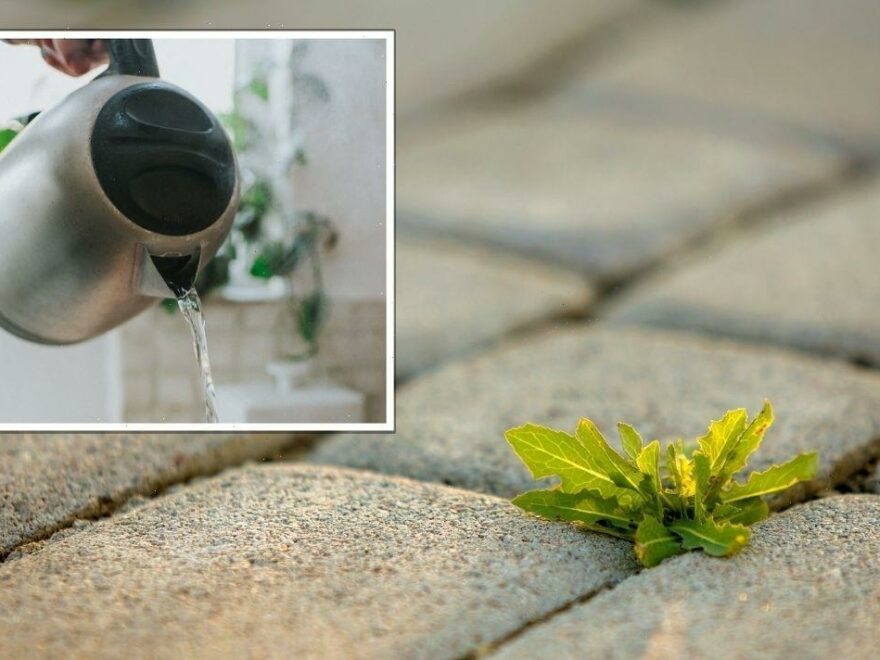Gardening expert demonstrates how to get rid of weeds
We use your sign-up to provide content in ways you’ve consented to and to improve our understanding of you. This may include adverts from us and 3rd parties based on our understanding. You can unsubscribe at any time. More info
There is nothing worse than an ugly weed wrecking the look of an otherwise beautiful garden. There are a ton of different weed killing products on the market but there are also many unknown cheap and natural ways to rid gardens and pathways of weeds. Gardening experts at Sand & Stone Landscapes have shared several ways to remove these pesky weeds for such low costs.
The first solution suggested was to scald the weeds with boiling water.
The method is so simple but can work a treat and takes no effort whatsoever.
The experts said: “Boil some tap water in a kettle and once ready pour it directly on the crown of your weeds.
“Larger weeds may take three or four applications in order to stop coming back but this is a low cost and hassle free solution worth giving a try!
“Some people have actually seen this method work better than the vinegar method.”

Just be sure to wear adequate protection clothing so that the scalding hot water doesn’t splash back onto your feet, legs or hands.
Those who want to try out the white vinegar method, it can also be effective as it draws out the moisture from the plant.
The experts said: “Vinegar is cheap, readily available at your local supermarket and is all natural.
“Sounds like the perfect product for killing weeds but there are a few things you need to keep in mind.”
The main active ingredient in white vinegar is acetic acid, usually around five percent. The ingredient comes via the fermentation process when it is derived from grain or apples.
DON’T MISS:
Cleaning: How to unblock drains using hair removal cream [TIPS]
Laundry: How to avoid ‘irreversible damage’ when washing clothes [EXPERT]
Laundry: How to properly remove ‘yellow’ stains from pillows [COMMENT]
Acetic acid is a terrific weed killer but it is also a terrific plant killer.
The gardening gurus continued: “Acetic acid works by drawing all of the moisture out of the weed or plant leaf.
“It is quick to work and it would be common to see a weed or plant brown up after only a few hours of having vinegar applied to its leaves in the full sun.
“Just be careful though, vinegar may kill any weed or plant it touches. Spray it carefully on weeds only (ensuring none hits your plants) with a spray bottle or pump sprayer when there is no wind.”

Gardeners can also stop weeds from germinating using polenta.
Given that polenta will stop any type of seed from germinating it is important not to use this method on a newly established vegetable garden until such a time as all of the plants have established themselves.
Another kitchen cupboard item that can be used to eliminate weeds is salt.
The experts said: “Grab your regular table salt and apply a pinch to the base of any weeds you would like to see gone.
“No need to water it in, let the rain do that over time. Salt isn’t selective, it will kill everything it touches so avoid spilling it on your plants and/or grass areas.
“Remember that once it dilutes in the rain it may spread a little too. Lastly, proceed with caution if using salt on paved areas as repeated uses may cause some damage to your pavers.”

Weeds need light and a warm soil bed to thrive, so starving them of light and nutrients by spreading mulch is an effective solution.
Mulch can be used to prevent weeds as they don’t have enough power to push all the way through the mulch.
Those who have existing weeds be sure to remove them before applying mulch.
The experts explained: “Once it comes time to apply, spread a three inch thick layer of mulch to the areas needed to prevent weed seeds from germinating.
“Three inches is usually enough to keep weed roots from sprouting.
“Mulch doesn’t just assist with weed growth, it prevents the soil from drying out and can reduce watering requirements by about 50 percent.”
Source: Read Full Article
